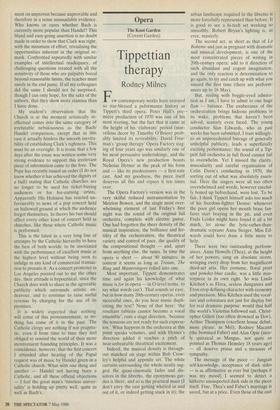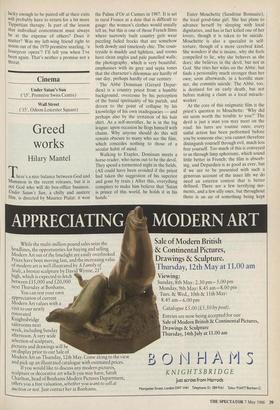Opera
The Knot Garden (Covent Garden)
Tippettian therapy
Rodney Milnes
Few contemporary works have enjoyed so star-blessed a peformance history as Tippett's third opera. Peter Hall's pre- - miere production of 1970 was one of his most riveting, but the fact that it came at the height of his 'elaborate' period (mar- vellous decor by Timothy O'Brien) prob- ably limited its revivability. David Free- man's 'group therapy' Opera Factory stag- ing of four years ago was similarly one of his most persuasive undertakings, and the Royal Opera's new production boasts Nicholas Hytner at the peak of his form and — like its predecessors — a first-rate cast. And my goodness, the piece itself deserves all this and repays it ten times over.
The Opera Factory's version was in the very skilful reduced instrumentation by Meirion Bowen, and the single most over- whelming element of last Friday's first night was the sound of the original full orchestra, complete with electric guitar. One had forgotten the sheer density of the musical inspiration, the brilliance and fer- tility of the orchestration, the theatrical variety and control of pace, the quality of the compositional thought — and, apart from anything else, the tunes. In time the opera is short — about 90 minutes; in content it seems as long as Tristan, The Ring and Mastersingers rolled into one.
Most important, Tippett demonstrates time and again his knowledge of what music is for in opera — in 0-level terms, to say what words can't. That sounds so easy, but in how many 20th-century operas, even successful ones, do you hear music dupli- cating the text? None of that here: 'the resultant tableau cannot become a vocal ensemble', runs a stage direction, 'because the tensions are not ready for such express- ion.' What happens in the orchestra at this point speaks volumes, and with Hytner's direction added it reaches a pitch of near-unbearable theatrical excitement.
Indeed, the musical density is through- out matched on stage within Bob Crow- ley's helpful and apposite set. The white curtains surrounding the whole neatly sug- gest the quasi-cinematic fades and dis- solves in the libretto, the eponymous gar- den is there, and so is the practical maze (I don't envy the cast getting whirled in and out of it, or indeed getting stuck in it); the urban landscape required in the libretto is more forcefully represented than before. It is good to see a hi-tech set working so smoothly. Robert Bryan's lighting is, as ever, masterly.
The second act, as short as that of La Boheme and just as pregnant with dramatic and musical development, is one of the most concentrated pieces of writing in 20th-century opera: add to it direction of such abundant and cogent imagination, and the only reaction is determination to go again, to try and catch up with what you missed the first time (there are perform- ances up to 16 May).
But, reeling with boggle-eyed admira- tion as I am, I have to admit to one huge flaw — balance. The exuberance of the orchestration brings hideous problems in its wake, problems that haven't been solved, scarcely even faced. The young conductor Sian Edwards, who in past weeks has been submitted, I trust willingly, to an unprecedented barrage of generally unhelpful publicity, leads a superficially exciting performance: the sound of a Tip- pett full orchestra in full flood cannot fail to overwhelm. Yet I missed the clarity, muscularity and careful organisation of Colin Davis's conducting in 1970, the sorting out of what was absolutely essen- tial. Here the singers were all too often overwhelmed and words, however careful- ly boned up beforehand, were lost. To be fair, I think Tippett himself asks too much of his freedom-fighter Denise: whenever the poor girl opens her mouth brass fan- fares start braying in the pit, and even Frida Leider might have found it all a bit much, let alone the lyric-rather-than- dramatic soprano Anna Steiger. Miss Ed- wards could have done a little more to help.
There were two outstanding perform- ances. Anne Howells (Thea), at the height of her powers, sang an absolute storm, wringing every drop from her magnificent third-act aria. Her costume, floral print and powder-blue cardie, was a little mas- terpiece in its own right. So was Linda Kitchen's as Flora, sexless dungarees and Eton crop defining character with economy and precision. Miss Kitchen used the vocal- ises and coloratura not just for display but for real dramatic purpose: would that half the world's Violettas followed suit. Christ- opher Gillett (too often drowned as Dov), Arthur Thompson (excellent house debut, more please, as Mel), Rodney Macann (the bemused Faber) and Alan Opie (nice- ly quizzical as Mangus, not quite so pointed as Thomas Hemsley 18 years ago) — all deserve praise and a measure of sympathy.
The message of the piece — Jungian self-knowledge, acceptance of dark sides — is as affirmative as ever but (perhaps it was my mood) I seemed to detect a hitherto unsuspected dark side in the piece itself. Fine, Thea's and Faber's marriage is saved, but at a price. Even those of the cast
lucky enough to be paired off at their exits will probably have to return for a bit more TIppettian therapy. Is part of the lesson that individual contentment must always be at the expense of others? Does it matter? Was my left-wing friend right to storm out of the 1970 premiere snarling, 'a bourgeois opera'? I'll tell you when I've been again. That's neither a promise nor a threat.























































 Previous page
Previous page